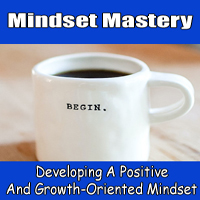



Procrastination, that cunning adversary that lurks in the shadows of our ambitions, has the power to hinder our progress and delay our dreams. It's a habit many of us struggle with, but it's not invincible. Through the path of self-mastery, we can conquer this formidable foe and emerge as more productive and successful individuals.
Understanding Procrastination: Procrastination often arises from a lack of self-discipline and an overindulgence in instant gratification. It's the inclination to choose short-term comfort over long-term gain, to delay tasks until they become urgent, and to make excuses for our inaction. Recognizing that procrastination is a manifestation of our internal struggles is the first step toward self-mastery.
The Role Of Self-Mastery: Self-mastery is the art of gaining control over one's impulses, emotions, and actions. It's about harnessing one's willpower to overcome challenges and obstacles, procrastination being one of them. To defeat procrastination, we must develop self-mastery, which is a lifelong journey of self-improvement and discipline.
Strategies For Self-Mastery And Procrastination Defeat:
Set Clear And Compelling Goals: Self-mastery begins with setting clear, specific, and motivating goals. When you have a compelling reason to act, it becomes easier to resist procrastination. Your goals serve as a North Star guiding your actions.
Practice Mindfulness: Mindfulness helps you become more aware of your thoughts and emotions. When you notice procrastination creeping in, you can intervene and redirect your focus toward the task at hand. Techniques such as meditation and deep breathing can help you cultivate mindfulness.
Establish A Routine: Building a structured routine creates a sense of predictability and discipline in your daily life. Knowing when and where you should be working on tasks reduces the likelihood of procrastination.
Use The Two-Minute Rule: If a task takes less than two minutes to complete, do it immediately. This simple rule can prevent small tasks from piling up and becoming sources of procrastination.
Embrace The Pomodoro Technique: The Pomodoro Technique involves working in focused, short bursts (usually 25 minutes) followed by a short break. This can be highly effective in combating procrastination and maintaining concentration.
Practice Delayed Gratification: Train yourself to delay immediate gratification for a more substantial reward in the future. This shift in mindset can help you resist the temptation to procrastinate.
Accountability And Support: Seek an accountability partner or mentor who can provide guidance and hold you responsible for your commitments. Sharing your goals and progress with someone can be a powerful motivator.
Celebrate Small Wins: Recognize and celebrate your achievements, no matter how small they may seem. This positive reinforcement can boost your confidence and motivation to continue on the path of self-mastery.
The Journey To Self-Mastery: Self-mastery is a journey, not a destination. It requires dedication, patience, and self-compassion. There will be days when procrastination wins, but self-mastery means learning from these setbacks and persevering. It's about developing resilience and a growth mindset that propels you forward.
Self-mastery is the key to defeating procrastination and achieving your goals. By mastering your thoughts, emotions, and actions, you gain the power to overcome procrastination's grasp. The path to self-mastery is not easy, but it's a journey well worth embarking on for a more productive and fulfilled life. Embrace the challenge, and you'll find yourself marching boldly toward your aspirations, leaving procrastination behind.




 Embracing Challenges: Individuals with a growth-oriented mindset welcome challenges as opportunities for learning and improvement. They see difficulties not as obstacles but as stepping stones on their journey to success. This attitude encourages them to step out of their comfort zones and tackle new, unfamiliar tasks.
Embracing Challenges: Individuals with a growth-oriented mindset welcome challenges as opportunities for learning and improvement. They see difficulties not as obstacles but as stepping stones on their journey to success. This attitude encourages them to step out of their comfort zones and tackle new, unfamiliar tasks.
Continuous Learning: In a growth-oriented mindset, learning is a lifelong journey. These individuals understand that personal and professional development is an ongoing process. They actively seek knowledge, skills, and experiences that contribute to their growth and development.
Effort And Persistence: People with a growth-oriented mindset recognize that effort and persistence are the keys to success. They understand that mastery in any field requires hard work and dedication. Instead of being discouraged by initial failures, they use setbacks as motivation to try again and improve.
 Positive Mindset: Mental strength is closely connected to maintaining a positive mindset, even when faced with setbacks. It's about focusing on solutions rather than dwelling on problems. This positive attitude not only alleviates stress but also attracts constructive outcomes.
Positive Mindset: Mental strength is closely connected to maintaining a positive mindset, even when faced with setbacks. It's about focusing on solutions rather than dwelling on problems. This positive attitude not only alleviates stress but also attracts constructive outcomes.
Resilience: Resilience is the hallmark of mental strength. When life throws curveballs, mentally strong individuals bounce back with determination. They understand that setbacks are part of the journey and do not let failures define them. Resilience keeps them moving forward.
Self-Confidence: Mental strength nurtures self-confidence. Believing in one's abilities and potential is pivotal to overcoming challenges. Self-assured individuals are more likely to tackle new opportunities, make decisions, and push their boundaries.
Stress Management: Mental strength equips individuals with the tools to manage stress effectively. Instead of succumbing to pressure, they develop coping mechanisms that help them stay calm and composed under trying circumstances.
Adaptability: Mental strength enables adaptability. It allows individuals to adjust to changing situations, whether in personal or professional life. They are open to new ideas and possess the flexibility to adapt to unexpected turns of events.
Optimism: Maintaining optimism is a significant component of mental strength. It's about looking at the glass as half full rather than half empty. An optimistic outlook not only boosts self-esteem but also encourages others to adopt a positive attitude.
Focus And Determination: Mentally strong individuals are often highly focused and determined. They set clear goals and work tirelessly to achieve them. Distractions and self-doubt are minimal when mental strength is at its peak.
Empowering Your Journey To Self-Worth
 Understanding Inadequacy
Understanding Inadequacy
Inadequacy is a psychological state characterized by a sense of not being good enough or capable. It often leads to negative self-perception and self-doubt, which can hinder various aspects of life, including personal relationships, professional development, and overall well-being. These feelings can manifest in different ways, from low self-esteem to persistent anxiety and self-criticism.
Root Causes Of Inadequacy
Inadequacy often has complex origins that may vary from person to person. Some common factors include:
Early Life Experiences: Childhood experiences, such as parental expectations or experiences of rejection, can significantly impact self-esteem and contribute to feelings of inadequacy.
Social Comparisons: Constantly measuring oneself against others and feeling inferior can be a potent source of inadequacy.
Perfectionism: Striving for an unrealistic standard of perfection can foster feelings of inadequacy when one inevitably falls short.
Failure And Rejection: Past experiences of failure, rejection, or criticism can perpetuate a sense of inadequacy.
Negative Self-Image: A distorted self-image, whether related to body image or self-worth, can exacerbate feelings of inadequacy.
Unveiling Their Hidden Potentials
 Empathetic And Compassionate: Introverts often possess a high degree of empathy. They are attuned to the feelings and needs of those around them, making them exceptional friends, counselors, and caregivers. Their ability to connect with others on a deep emotional level is a strength that fosters meaningful relationships.
Empathetic And Compassionate: Introverts often possess a high degree of empathy. They are attuned to the feelings and needs of those around them, making them exceptional friends, counselors, and caregivers. Their ability to connect with others on a deep emotional level is a strength that fosters meaningful relationships.
Effective Communication: Introverts are excellent listeners. They listen attentively, process information, and respond thoughtfully. This skill not only enhances their understanding of others but also makes them great communicators. In professional settings, this can lead to effective negotiation and conflict resolution.
Creativity And Innovation: Introverts often have a rich inner world, which fuels their creativity. They are more likely to come up with original ideas and creative solutions to problems. Their preference for quiet and solitude provides the perfect environment for innovative thinking.
Strong Focus And Attention To Detail: Introverts excel in tasks that require intense concentration. Their ability to maintain focus for extended periods allows them to produce high-quality work with attention to detail. This quality is invaluable in professions that demand precision and thoroughness.
Overcoming Emotional Baggage From The Past
 Acknowledge And Identify The Baggage
Acknowledge And Identify The Baggage
The first step in overcoming emotional baggage is to acknowledge its existence and identify the specific emotions, experiences, or beliefs that contribute to it. Reflect on past experiences and their emotional impact, and recognize the patterns or triggers that continue to affect your life.
Emotional Processing And Acceptance
Emotional processing involves allowing yourself to feel and accept the emotions associated with past experiences. This can be a difficult and sometimes painful process, but it is essential for healing. Give yourself permission to experience the full range of emotions, without judgment or self-criticism.
Seeking Support
Overcoming emotional baggage is not a journey you have to undertake alone. Reach out to trusted friends, family, or a therapist for support. Talking about your feelings and experiences can provide valuable insights, different perspectives, and emotional validation.
Forgiveness, Including Self-Forgiveness
Forgiveness is a powerful tool for unburdening emotional baggage. This includes forgiving those who have hurt you and, equally importantly, forgiving yourself. Forgiveness is a means of releasing the emotional grip of the past and moving forward.
Setting Healthy Boundaries
Establishing and maintaining healthy boundaries is a crucial aspect of overcoming emotional baggage. These boundaries protect your emotional well-being and prevent further harm. They also help you navigate future relationships with a sense of self-respect and self-worth.